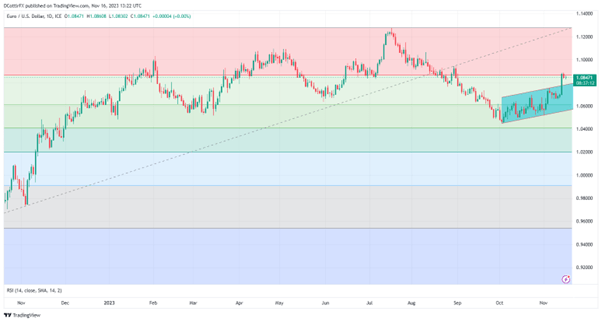EUR/USD Analysis and Charts
- EUR/USD jumped this week as US inflation slowed down
- It has held most of those gains through Thursday’s session
- Key resistance still eludes the bulls, however
Learn How to Trade EUR/USD With our Complimentary Guide
Recommended by David Cottle
How to Trade EUR/USD
The Euro has hung on to most of its recent sharp gains against the United States Dollar in Thursday’s trade but has returned some of them as the remainder of this week is short of obvious trading cues, leaving EUR/USD more adrift. The single currency has risen since early October as global markets have started to believe that, not only will US borrowing costs rise no further, they might just start to come down next year. The latest deceleration in official US consumer-price inflation did no harm at all to this thesis and saw the greenback take a general knock. As a result, EUR/USD has clawed back up to levels not seen since the end of August.
It is perhaps tempting to suggest that the Euro’s recent vigor is purely a ‘Dollar weakness’ story. It has certainly come in the absence of first-tier Eurozone data. To be sure the bloc’s performance remains patchy, with local numbers often at least as likely to undermine the euro as support it. Recall the soft Purchasing Managers Index data of early September which sent EUR/USD down to three-month lows. Indeed, the European Commission has this week downgraded its forecasts for growth in the currency bloc this year and next, as higher borrowing costs hit economic activity. In its autumn forecast, the EC looked for growth of 0.6% in 2023, below the hardly thrilling 0.8% predicted before (next year’s call is 1.3% down from 1.4%). The Commission noted that the local economy had lost momentum after a quite robust recovery from the COVID-19 pandemic.
European Central Bank President Christine Lagarde spoke on Thursday but she stuck broadly to her topic of systemic risk and didn’t have anything much for traders to get excited about. The markets will get a look at final Eurozone core and headline inflation for October on Friday. Both are expected to have relaxed from initial estimates, with the core measure expected to come in at 4.2% on the year, down from 4.5%. The headline measure is tipped at 2.9%, well below the initial 4.3%. As-expected figures may well undermine the Euro as similar signs of relaxing inflation have for the Dollar and the British Pound this week. That release aside the only major number coming up this week will be from the US, in the form of October’s building permit figures.
EUR/USD Technical Analysis
Chart Compiled Using TradingView
Euro bulls are struggling to get EUR/USD convincingly past the psychological 1.0850 resistance mark. Just above it lies 1.08669 which was the first Fibonacci retracement level of the rise from late September 2022’s lows to the high seen in July of this year. That level was surrendered at the end of August, and it now stands as significant resistance. Near-term breaks above this might be suspect, however, as the Euro has jumped above its previous uptrend and, while that might resume, it may need to take some time before it can sustainably retake that retracement level and make a fresh assault on this year’s highs.
The pair’s Relative Strength Index is nudging up again toward the ‘overbought’ 70.0 level, which, again, might suggest that the bulls need a pause. The previous uptrend channel now offers support at 1.07843, ahead of November 6’s intraday high of 1.07597. Still, if the market can top 1.0850 and forge up to resistance at 1.0890, it could yet see another leg higher. The week’s close relative to these levels could be instructive for near-term direction.
See How IG Retail Sentiment Can Help You When Trading
IG’s own client sentiment numbers are mixed, with 42% net long, 58% going short, perhaps emphasizing how unsettled EUR/USD is at current heights.
| Change in | Longs | Shorts | OI |
| Daily | 10% | -10% | -2% |
| Weekly | -31% | 23% | -8% |
–By David Cottle for DailyFX
Credit: Source link




